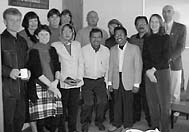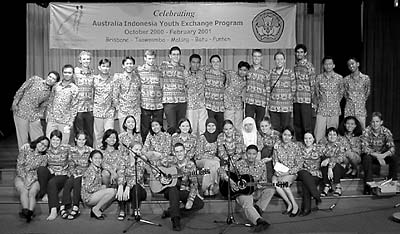Annual Report 2000–2001 home | Mission statement | Chairmans statement | Board membership | Media | Youth and education | Arts and sport | Civil society | Commercial and the professions | Administrative overview | Appendix A: Financial statements | Appendix B: Order-in-Council
YOUTH AND EDUCATION PROGRAM
The Institute aims to build groups of young and potentially influential people in both Australia and Indonesia who have an understanding and knowledge of the two countries. It also aims to develop a network of Indonesians who can interpret Australian society and policies for the Indonesian people and government.
Youth and education was a major focus for the Institute in 2000–2001, with around 46 per cent of project funds allocated to this program. Teacher exchanges remained a key activity and the re-commencement in 2000–2001 of the annual Australia–Indonesia Youth Exchange Program (AIYEP), which had been postponed a year earlier owing to security concerns, was a major AII undertaking. An important activity for the Institute was its implementation of a strategy to strengthen the Australian Studies component of the Youth and Education program. With AusAID assistance, the Institute also provided scholarships for 585 Indonesian students to allow them to complete their courses of study at Indonesian universities.
AII professional development teacher exchange
Since its inception, the Institute has funded over 350 scholarships for Australian primary school teachers to study Indonesian language and culture. This program was revitalised in 2000 in the form of a professional development exchange program for Australian and Indonesian school teachers managed by the Asia Education Foundation (AEF). The program is advertised each year in April.
The purpose of this program is to provide professional development training for teachers from both countries, to improve their language skills, to expose them to stimulating ideas and genuine experiences of life in each others country as well as to encourage long-term personal and institutional contacts.
From 29 December 2000 to 19 January 2001, 22 Australian teachers were located at Manado, North Sulawesi. The teachers were placed in local schools to observe the Indonesian school system, team-taught with Indonesian teachers and delivered lessons in English and, on occasions, Bahasa Indonesia. They also completed a seminar program on Indonesian society and culture at Manado State University (UNIMA) and made site visits to light industrial districts and cultural venues. The Australian participants were accommodated with local families in the Manado community. It is estimated that the Australian participants had contact with more than 7000 Indonesians during their tour.

The Asia Education Foundation primary school teachers exchange program of 2001 at Tomohon, Minahasa Region, January 2001
I gained something from everything within the program. The interaction with the staff from UNIMA, my home-stay family and school and everyone else that I made contact with during this time provided the most for me on both a personal and professional level. The school experience and home-stay were definite highlights in terms of opportunities. Being in the thick of it with your ears, eyes and mind open allows for so many wonderful experiences.
— Nicole Wearne, teacher exchange participant.
Eleven Indonesian teachers from Manado arrived in Australia during the second half of 2001 to commence their exchange program. They will undertake work placements and cultural and home-stay programs and teach in Australian schools. Their hosts during this inaugural visit under the exchange program will be the Australian teachers who travelled earlier to North Sulawesi. The Indonesians will visit Sydney and Canberra during their stay, the duration of which will be approximately two weeks.
Civic School project: University of Tasmania
The Institute supported the Civic School project, a collaborative venture between the University of Tasmanias Faculty of Education and the Padang State University (UNP), West Sumatra, for the development of primary school teachers in West Sumatra in citizenship education. The project, initiated by UNP, was conceived as a means of supporting Indonesian democracy by promoting changes in teaching practice needed to implement new civic goals introduced by the Indonesian Government in 1999. These goals include encouraging students to empathise with others, express their own opinions and respect those of others.
In January and February 2001, seven Australian teachers and pre-service teachers (with Indonesian language skills and specialising in teaching Language Other Than English (LOTE)) visited Padang, West Sumatra, to work with Indonesian staff teams at eight primary schools in the province. The Australian team members modelled the development of democratic primary classrooms and language use through interaction with Indonesian counterparts, observation of civic education teaching methods and appraisal of civic education textbooks used in Indonesian schools. Home-stay experiences, language seminars and other activities also aided the Australians in improving their language proficiency.

Educators from Padang West Sumatra visiting Tasmanian primary schools as guests of the Department of Education and the University of Tasmania
In the short term, the project has provided professional development and networking opportunities for Australian LOTE teachers. Four educators from UNP visited Tasmanian primary schools from 18 June to 8 July 2001 as part of a reciprocal professional experience. The visit attracted substantial media focus in Tasmania and enhanced substantially the prospects for long-term linkages between Padang and Tasmanian Universities.
In the longer term, the project is expected to produce a professional development package for civic practice. The research and development conducted in Indonesia will provide a basis for further educational exchange between Australia and Indonesia in citizenship education and is likely to give Australian educators opportunities to be involved in the reform of citizenship education in Indonesia.
Australian Alumni Association of Indonesia (IKAMA)
Institute sponsorship also supported the institutional strengthening of the Australian Alumni Association of Indonesia (IKAMA). This support took the form initially of an AII-funded consultants study examining means for strengthening alumni relations. Subsequent AII support for IKAMA included assistance with web site development, the production of a promotional leaflet for Indonesian students studying in Australia and about to return home, database development, a publicity seminar and the development of IKAMAs commercial capacity.
Australia–Indonesia Youth Exchange Program (AIYEP)
The Australia–Indonesia Youth Exchange Program (AIYEP) recommenced in 2000–2001, following its deferral in 1999–2000. The program involved 18 Indonesian and 18 Australian participants aged between 20 and 25 making a two-month visit to Australia and Indonesia respectively. As in earlier years, the 2000–2001 program was conducted in accordance with a Memorandum of Understanding (MOU) concluded between the Australian and Indonesian Governments.
The Australian leg of the program rotates from State/Territory to State/Territory each year. The Indonesian 2000–2001 AIYEP participants were hosted by Australian families in Brisbane and Toowoomba during October and November and performed work experience in both locations.
In late November 2000, the group travelled to Canberra and linked up with their Australian counterparts to complete an orientation program there. The Canberra program included a call on the Minister for Foreign Affairs, Mr Downer, a function hosted by the Indonesian Embassy and the opportunity to see first hand many of Canberras famous landmarks. During the Canberra program, participants also met AII Board members.

Members of the Australia Indonesia Youth Exchange Program (AIYEP) 2000–2001 during a reception in Jakarta
Australian AIYEP participants visited Indonesia during December 2000 and January 2001, travelling to Indonesia with their Indonesian colleagues. On arrival, they received briefings from the Australian Ambassador, Indonesias Minister for Education and Culture and the Governor of East Java. During their stay in Indonesia, the Australians were each accommodated with a village family in Punten (East Java province) and took up work placements with government and corporate institutions, and undertook projects in the area. The AIYEP activities received regular media coverage in East Java and also featured on regional television broadcasts in Jakarta and Surabaya.
Australian Studies
In November 2000, the Minister for Foreign Affairs, Mr Alexander Downer, announced that the Institute would strengthen the Australian Studies component of its Youth and Education program through an increased allocation of $100 000 from within the existing budget. Concurrently, a committee of Institute board members prepared an Australian Studies strategy paper. The strategys core principles are posted on the AII web site as guidelines for prospective applicants with an interest in Australian Studies.
Subsequently, the Institute provided $50 000 to the Australian Studies Centre at the University of Indonesia in support of an Australian Studies Centre University of Indonesia outreach program. In March 2001 in Surabaya, AII board members hosted rectors from East Java universities at a roundtable discussion on Australian Studies. Since this time, the Institute has received a range of funding applications from Indonesian universities from East Java and elsewhere for Australian Studies projects.
Scholarships for Indonesian university students
Mr Downer also announced in November 2000 that, with AusAID assistance, the Institute would award scholarships to 585 Indonesian students from the Universities of Indonesia and Gadjah Mada to help them complete their studies. This important initiative, which was implemented at a time when difficult economic conditions in Indonesia meant that many Indonesian students might not complete their studies, was administered by the Australian Embassy in Jakarta.
Annual Report 2000–2001 home | Mission statement | Chairmans statement | Board membership | Media | Youth and education | Arts and sport | Civil society | Commercial and the professions | Administrative overview | Appendix A: Financial statements | Appendix B: Order-in-Council
